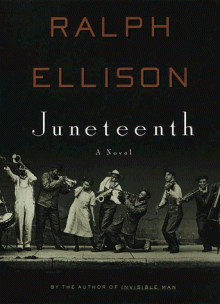Juneteenth, the Senator said, closing his eyes, his bandaged head resting beneath his hands. Words of Emancipation didn't arrive until the middle of June, so they called it Juneteenth. . . .In Washington, D.C., in the 1950s, Adam Sunraider, a race-baiting senator from a New England state, is...
show more
Juneteenth, the Senator said, closing his eyes, his bandaged head resting beneath his hands. Words of Emancipation didn't arrive until the middle of June, so they called it Juneteenth. . . .In Washington, D.C., in the 1950s, Adam Sunraider, a race-baiting senator from a New England state, is mortally wounded by an assassin's bullet while making a speech on the Senate floor. To the shock of all who think they know him, Sunraider calls out from his deathbed for Hickman, an old black minister, to be brought to his side. The Reverend is summoned; the two are left alone. Out of their conversation, and the inner rhythms of memories whose weight has been borne in silence for many long years, a story emerges. For this United States senator, once known as Bliss, was raised by Reverend Hickman in a religion- and music-steeped black community not unlike Ralph Ellison's own childhood home. He was brought up to be a preaching prodigy in a joyful black Baptist ministry that traveled throughout the South and the Southwest. Together one last time, the two men retrace the course of their shared life in "an anguished attempt," Ellison once put it, "to arrive at the true shape and substance of a sundered past and its meaning." In the end the two men arrive at their most painful memories, memories that hold the key to understanding the mysteries of kinship and race that bind them, and to the senator's confronting how deeply estranged he has become from his true identity. Juneteenth draws on the full richness of America's black cultural heritage, from the dazzling range of vernacular sources in its language to the way its structure echoes the call-and-response pattern of the black church and the riffs and bass lines of jazz. It offers jubilant proof that whatever else it means to be a true American, it means to be "somehow black," as Ellison once wrote. For even as Senator Sunraider was bathed from birth in the deep and nourishing waters of African-American folkways, so too are all Americans. That idea is the cause for which Ralph Ellison gave the last full measure of his devotion. At the time of his death, he was still expanding his novel in other directions, envisioning a grand, perhaps multivolume, story cycle. Always, in Ellison's mind, the character Hickman and the story of Sunraider's life from birth to death were the dramatic heart of the narrative. And so, with the aid of Ellison's widow, Fanny, his literary executor, John Callahan, has edited this magnificent novel at the center of Ralph Ellison's forty-year work-in-progress--Juneteenth, its author's abiding testament to the country he so loved and to its many unfinished tasks.
show less

